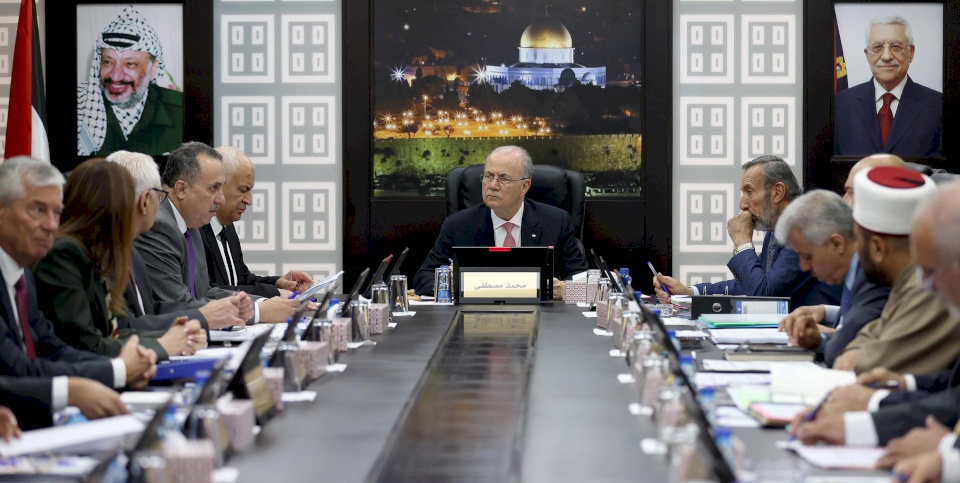
The Cabinet Calls for Urgent International Action to Save Gaza Strip
SadaNews: The Cabinet, during its weekly meeting today, Tuesday, urged various countries around the world to take urgent action to save the Gaza Strip, amid the announcement by the occupation army of the start of a ground invasion of Gaza City following threats to its residents and demands for their forced evacuation. It emphasized that putting Palestinians in a position where they face two choices: death or displacement is a precedent not witnessed in modern history, and can only be described as a complete war crime against two million Palestinian civilians who have suffered from the occupation's brutality through killings, burning, and starvation, while those who survived have been deprived of the most basic necessities of life.
The Cabinet also strongly condemned the escalation of occupation practices, including the increased closure measures, land confiscation, and the erection of barriers and iron gates at the entrances to Palestinian villages, which exceed one thousand barriers and gates. This reflects collective punishment and racial segregation that has extended deep into Palestinian territories. Furthermore, it condemned the targeting of Palestinian workers, who are Martyrs of their livelihood, in areas of contact, where they are killed in cold blood without posing any threat.
The council warned of the dangers of the occupation's decision to control the inner courtyard of the Ibrahimi Mosque under the pretext of its roof, considering this a blatant violation of all international norms and laws. It affirmed that what is happening today in terms of the Judaization and targeting of the sacred Ibrahimi site is not merely a Palestinian matter, but a blatant assault on a global humanitarian heritage that concerns all of humanity, and represents a dangerous precedent for legitimizing settlement and displacement policies and destroying the cultural and religious identity of indigenous communities. In light of this, the council directed the relevant authorities to take urgent action with international organizations, led by UNESCO, to press for the cessation of these occupying practices.
Additionally, Prime Minister Dr. Mohamed Mustafa informed the council members of the political moves and diplomatic efforts led by the President in preparation for the international summit to support the New York Declaration, which will precede the United Nations General Assembly meeting. This will include a series of international recognitions, alongside ongoing efforts with various partners to garner more recognition for the State of Palestine, as well as efforts by the government to mobilize emergency financial resources at the upcoming donors' meeting on the margins of the General Assembly meeting.
In another context, the Cabinet approved the recommendations of the national team to combat the flooding of the local market with low-value and low-specification products, particularly in the clothing, footwear, stone, and cleaning product sectors as a first phase. The team has worked on creating a list of policies and procedures to regulate the markets in a way that contributes to enhancing reliance on national products, and has issued directives to relevant authorities for follow-up and regulation. It is worth noting that the national team includes several ministries of competency, private sector representatives, and financial and economic experts.
Furthermore, the Cabinet discussed the steps taken to resume work on the wastewater treatment plant project in Hebron and approved the additional annex to the consulting services contract for supervising the project, which will accelerate the pace of work after years of stagnation. This project is considered one of the largest infrastructure projects in the West Bank and will provide a fundamental solution to the wastewater problem in Hebron Governorate.
The council also tasked the relevant authorities to reconsider previous procedures and plans, and to develop a comprehensive plan to alleviate traffic crises and organize traffic flow on Qalandia Street to address the ongoing traffic crisis that has persisted for many years.
It approved the strategy for micro, small, and medium enterprises, which will contribute to the sustainable growth and development of the national economy, encourage entrepreneurship, increase the employment rate, and improve these projects' access to financing opportunities, as well as enhance the access of national products to regional and international markets.
The council also discussed in the second reading the national energy efficiency plan in Palestine for the years 2025-2030, aimed at rationalizing the consumption of traditional energy, increasing reliance on alternative energy sources, replacing high-consumption lighting systems and devices with energy-saving systems, raising awareness of energy efficiency principles among citizens, and enhancing investment in clean energy areas.
Additionally, it recommended that the President issue a special decree regarding the formation of the Higher Education Council, which will include university presidents, individuals of prominent academic and scientific standing, representatives from civil society and the private sector, and representatives from relevant governmental institutions.

Naim Qassem: Diplomatic Path Has Failed and We Adhere to Weapons

Spain Will Cooperate.. White House: The Regime in Iran Is Being 'Crushed' and There Are No...

Why Has China Not Actively Supported Its Ally Iran?

Israel Talks About Coordination Between Hezbollah and Iran to Carry Out Attacks and Fears...

Fears in the Pentagon: Rapid Consumption of Advanced US Munitions in the War on Iran

Israeli Army Bombs Huge Military Complex in Tehran

Israeli Estimates: Why is Iran Focusing Its Strikes on the Gulf?

